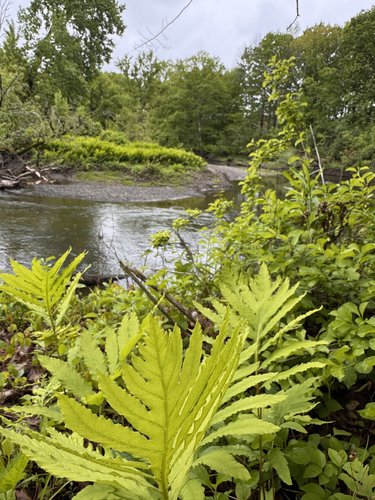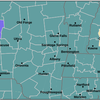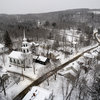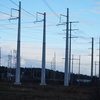‘Enjoy a connection with the natural world’: MHLC celebrates opening of Alplaus Kill Preserve
The Mohawk Hudson Land Conservancy is celebrating the opening of its first preserve in Schenectady County on July 15.
The public is invited to the opening, from 4 to 5:30 p.m., at 218 Alplaus Kill Preserve in Alplaus and asked to register on the conservancy’s website.
The 54-acre property in the hamlet of Alplaus was donated to the conservancy by Gray and Vicki Watkins and is its 23rd preserve. The preserve includes open fields, woods, and creeks, and showcases over a half-mile of frontage along the Alplaus Kill, a tributary that flows southward to the Mohawk River.
To get ready for the opening, 20 volunteers gathered at the preserve on June 21 to rake trails, set markers, and cut branches and vines.
Alplaus — the name comes from the Dutch for “Place of Eels” — is a small hamlet in the town of Glenville located just north of the Mohawk River.
Before European settlers arrived, Mohicans and Mohawks inhabited the area, catching fish and eel from the Alplaus Kill and using the stream to access trapping and trade routes on the Mohawk River. It was on the banks of the Alplaus Kill that French soldiers and Mohawk and Algonquin warriors camped before the famous retaliation battle, the Schenectady Massacre of 1690.
When Vicki and Gray Watkins met, while attending Union College, and then began their careers in Schenectady, they spent many hours hiking, riding bikes, paddling and exploring the natural areas of the Capital District and the Adirondacks. They also witnessed the region’s rural landscape change, highlighting the need for land preservation.
The Watkins moved to Alplaus in 1978 where both of their children, Steve and Jenny, were born and raised. Over the years, they pieced together 54 acres stretching north of Alplaus Avenue between the railroad tracks to the west and the Alplaus Kill to the east.
“We are experiencing a time where hyper-capitalism seems to be the norm,” said Gray Watkins in an April release from the conservancy. “As the use of technology increases, and dense development overtakes vacant land, our connection to nature decreases.
“It is so important to respect and appreciate nature, after all, the observation of natural phenomena, and the resulting ideas, form the basis of much human knowledge. We are excited to provide this space to the community, not only to enjoy a connection with the natural world but to preserve the power and beauty of this important parcel of land.”



